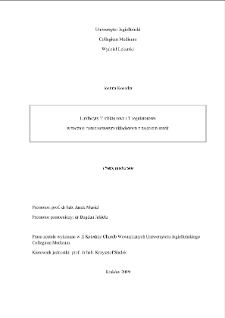Object
Title: T helper and T regulatory cells in systemic lupus erythematosus with kidney involvement
Abstract:
Lupus nephritis (LN) is one of the most severe manifestations of systemic lupus erythematosus. The etiology of the disease is complex and remains the subject of research.The objective of this study was to investigate the role of T CD4+ effector and T regulatory (Treg) cells in LN.34 patients with LN and 19 healthy controls were qualified for the study. Lymphocytes immunophenotyping was performed by using fluorescence-activated cell sorting to detect the chemokine receptors expression and by assessing cytokine production after stimulation with PMA and ionomycin. Treg cells were identified as CD25+CD127- and FoxP3 (transcription factor) positive. Treg cells function was defined by in vitro suppression assay, percentage of Treg cells with higher ΔE2 FoxP3 isoform expression and level of TGF-β1 secreted by stimulated in vitro Treg cells. Nineteen cytokines were measured in serum and urine by commercially available ELISA kits. mRNA expression of 43 genes form urinary cells was performed using real-time PCR.Th17 expansion in LN is not increased during disease exacerbation, but is rather related to the chronic immunosuppressive therapy. This immune signature is likely linked to the abnormal function of Treg cells, which were less suppressive in LN patients and even facilitated differentiation of Th17 cells. Type-1-cell related urine cytokines and gene markers in the urine sediment had ; significant diagnostic performance in detection of active LN.
Place of publishing:
Level of degree:
Degree discipline:
Degree grantor:
Promoter:
Musiał, Jacek ; Jakieła, Bogdan
Date issued:
Identifier:
Call number:
Language:
Access rights:
Object collections:
Last modified:
Mar 13, 2023
In our library since:
Aug 6, 2020
Number of object content hits:
12
Number of object content views in PDF format
0
All available object's versions:
http://dl.cm-uj.krakow.pl:8080/publication/4368
Show description in RDF format:
Show description in OAI-PMH format:
| Edition name | Date |
|---|---|
| ZB-131961 | Mar 13, 2023 |
Objects
Similar
Kosałka-Węgiel, Joanna
Wawrzycka-Adamczyk, Katarzyna
Kleczyńska-Szpakiewicz, Weronika
Zemelka-Wiącek, Magdalena
Knafel, Anna
Rutkowska-Zapała, Magdalena

